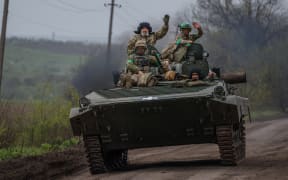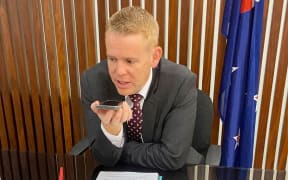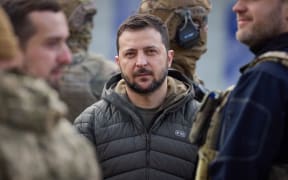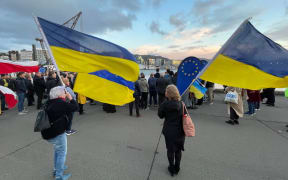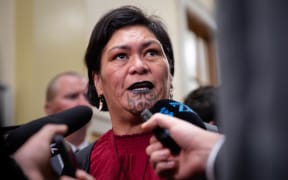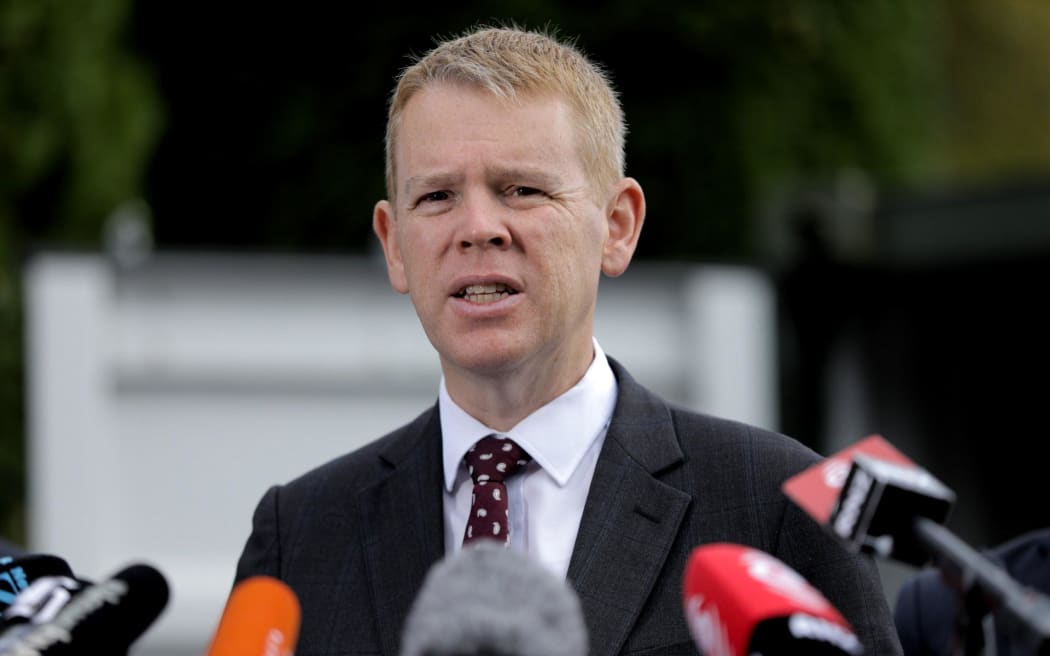
Prime Minister Chris Hipkins says New Zealand's resolve has not waned. Photo: RNZ / Angus Dreaver
New Zealand is increasing its military, humanitarian, legal and economic support for Ukraine.
Prime Minister Chris Hipkins announced the new measures while visiting New Zealand Defence Force personnel training Ukrainian soldiers at the Salisbury Army Training area outside of London, in the United Kingdom.
The new assistance includes extending the training deployment of 95 NZDF personnel until 30 June, 2024 and adding two additional NZDF staff to conduct space training programmes for members of the Ukraine Armed Forces in Poland, until 30 June, 2024.
"For more than a year New Zealand has stood with the people of Ukraine as they have been subject to a brutal, unrelenting and illegal invasion by Russia," Hipkins said.
"Since February last year New Zealand has taken significant and unprecedented actions to support Ukraine, including the deployment of NZDF troops into Europe and passing the Russia Sanctions Act that has enabled us to impose targeted sanctions for the first time outside of the UN framework.''
Over the past year New Zealand has contributed more than $78m of financial and military support.
The announcement also includes:
- $2m to the Ukraine Humanitarian Fund to support the provision of healthcare, food assistance, clean water, shelter and other assistance
- $1.5m to the UN High Commissioner for Refugees providing humanitarian support
- $500,000 towards a New Zealand Disaster Response Partnership with New Zealand NGOs on regional refugee response
- $1.3m will go to the International Criminal Court's Prosecutor's office and Trust Fund to help ensure legal accountability and justice for victims in Ukraine
"Today's package shows our resolve has not waned and our ongoing support for Ukraine and the international response has not diminished.''
"Unfortunately the conflict appears set to continue for some time. We and like minded partners will not back off and allow Russia to impose their might on the innocent people of Ukraine," he said.
So far 440 NZDF personnel have been deployed to support Ukraine, with 279 directly involved in the artillery and infantry training being carried out in the United Kingdom.
Defence Minister Andrew Little said more than 1000 Ukraine military have been trained.
"The extension of this deployment of 95 personnel providing training and supporting for the Ukrainian armed forces for a further year demonstrates both our ongoing commitment to the defence of their homeland as well as the value of this commitment.
"In addition to the infantry training, the NZDF has been invited by the United States to support training of Ukrainian personnel in western-led space operations and increase their interoperability with like-minded partners. This work may also include the training of Polish Armed Forces personnel," Little said.
NZDF personnel deployed to Europe will not enter Ukraine.
The NZDF will conclude its contribution of New Zealand-based open-source intelligence capability, which commenced in March 2022 to support the UK and other European partners' intelligence requirements. More than 12 months on from the start of the invasion, this no longer requires New Zealand support.
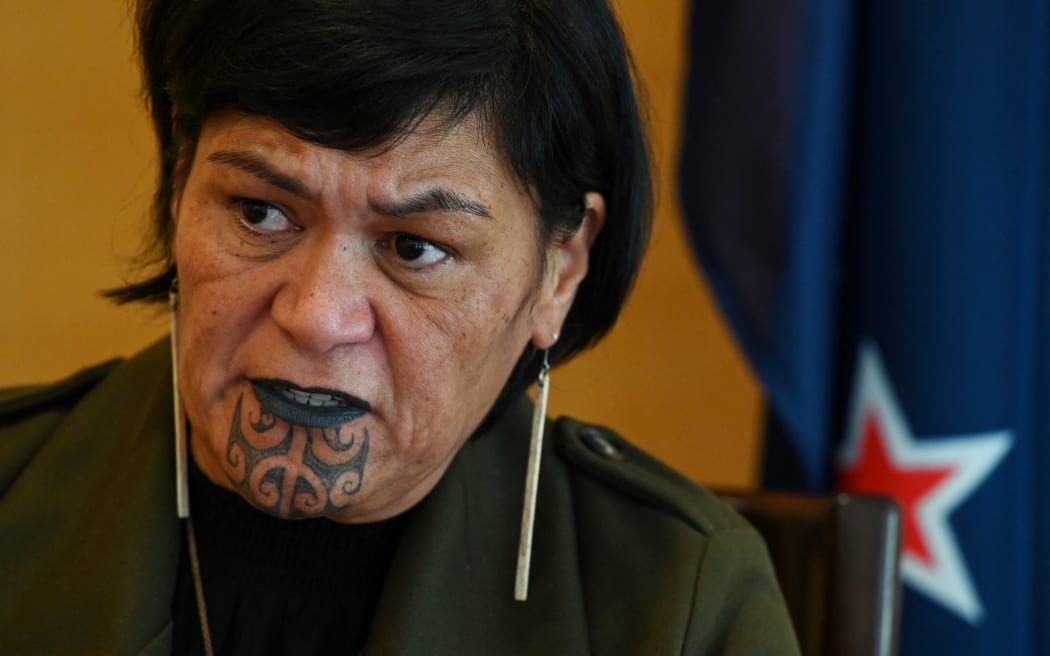
Foreign Affairs Minister Nanaia Mahuta says New Zealand continues to condemn Russia's "egregious and illegal actions". Photo: GREG BAKER / AFP
Further sanctions
The prime minister has also announced further sanctions targeting those supporting Russia's war against Ukraine.
Minister of Foreign Affairs Nanaia Mahuta said New Zealand now has sanctions targeting more than 1500 Russian and Belarussian individuals and entities.
"These sanctions cover senior leaders of the Russian Federal Security Service (FSB), Russia's internal security and intelligence service, the FSB itself, as well as other Russian individuals and entities who develop and procure weapons, technology and communication systems, and provide services such as transport and insurance - all vital to Russia's ability to wage war.
"Iranian individuals and entities are also being sanctioned for providing direct military support to Russia for its illegal war in Ukraine.'
"These sanctions are working. Our comprehensive trade sanctions have effectively decoupled the New Zealand and Russian economies. Since our trade sanctions were put in place total imports have fallen by almost 99 percent.
"We continue to condemn Russia's egregious and illegal actions. We repeat our call for President Putin to cease Russia's war against Ukraine, withdraw troops and then enter diplomatic negotiations to resolve this war," Mahuta said.
Total New Zealand actions in response to the war in Ukraine:
Banned exports to Russian and Belarusian military and security forces.
Suspended diplomatic consultations with Russia.
Passed the historic Russia Sanctions Act under which we have passed sanctions targeting (Including those announced today):
- Vladimir Putin and key members of his inner circle.
- Senior leadership of the Security Council of the Russian Federation.
- All 620 members of the Russian parliament (State Duma and Federation Council).
- All Russian Ministers and Governors.
- More than 340 entities including state-owned enterprises, entities that are part of Russia's military industrial complex, Donbas militia groups, Belarusian defence entities.
- More than 100 oligarchs and close family with close ties and influence with the Russian Government
- 19 financial institutions, including Russia's Central Bank
- 37 individuals and entities involved in disinformation and cyber-attacks on Ukraine
- 35 Belarusian leaders
- Almost 100 Russian-directed leaders in the Donetsk and Luhansk Peoples' Republics and occupied Ukrainian regions
- The Commissioner for Children's Rights in the Office of the President of the Russian Federation
- 11 Iranian individuals and seven Iranian entities for supplying drones to Russia
- Banned all Russian and Belarusian Government and military aircraft and vessels from New Zealand
Trade measures
- Implemented a 35 percent tariff on all Russian imports to New Zealand (this was due to expire in November but has been extended to 2025 to align with other sanctions)
- Banned the import of Russian gold into New Zealand
- Significantly expanded the export ban on Russia and Belarus to cover more industrial products of strategic importance (by adding more than 700 new prohibited tariff lines)
- Banned the import of Russian oil, gas, and coal
- Banned the export of oil exploration and oil production goods to Russia
- Banned the import from and export to Russia of certain luxury goods
Other assistance to Ukraine
Provided direct support to Ukraine's self-defence:
- $11.35m of non-lethal military assistance to support Ukraine via the NATO Trust Fund and communications equipment procured from TAIT
- $7.5m to contribute to weapons and ammunition procurement by the United Kingdom
- $4.1m to support commercial satellite access for the Ukrainian Defence Intelligence
- Surplus NZDF equipment also sent to Ukraine. 1066 x Body Armour Plates, 473 x Helmets, 571 x Camouflage Vests/Harness Webbing
- Deployment of defence force personnel to the United Kingdom, Belgium and Germany, to support our Ukraine through in training, intelligence, liaison, and logistics activities
- Provided $14.93m in humanitarian assistance for both refugees and those still inside Ukraine.
- Provided $2.615m to the International Criminal Court (ICC) to support the ICC's investigation into war crimes and crimes against humanity in Ukraine, with funding for the Office of the Prosecutor and the Trust Fund for Victims
- Secondment of a senior NZDF military officer to support the ICC investigation
- Provided $1m to the Office of the High Commissioner for Human Rights
- Intervening as a third party in support of Ukraine's International Court of Justice case against Russia
- Established a special Ukraine visa for family members of Ukrainian New Zealanders plus other visa changes.
Ukraine Special Visa Policy numbers as of 3 May
- 1116 Expressions of Interest in sponsoring received (of which 1,003 processed)
- 890 Invitations to Apply for Visas sent (includes 93 cancelled and 97 declined)
- 1553 visa applications received
- 1433 visas approved (1230 work visas and 203 student visas)
- 649 people granted Special Visas had arrived in New Zealand.
